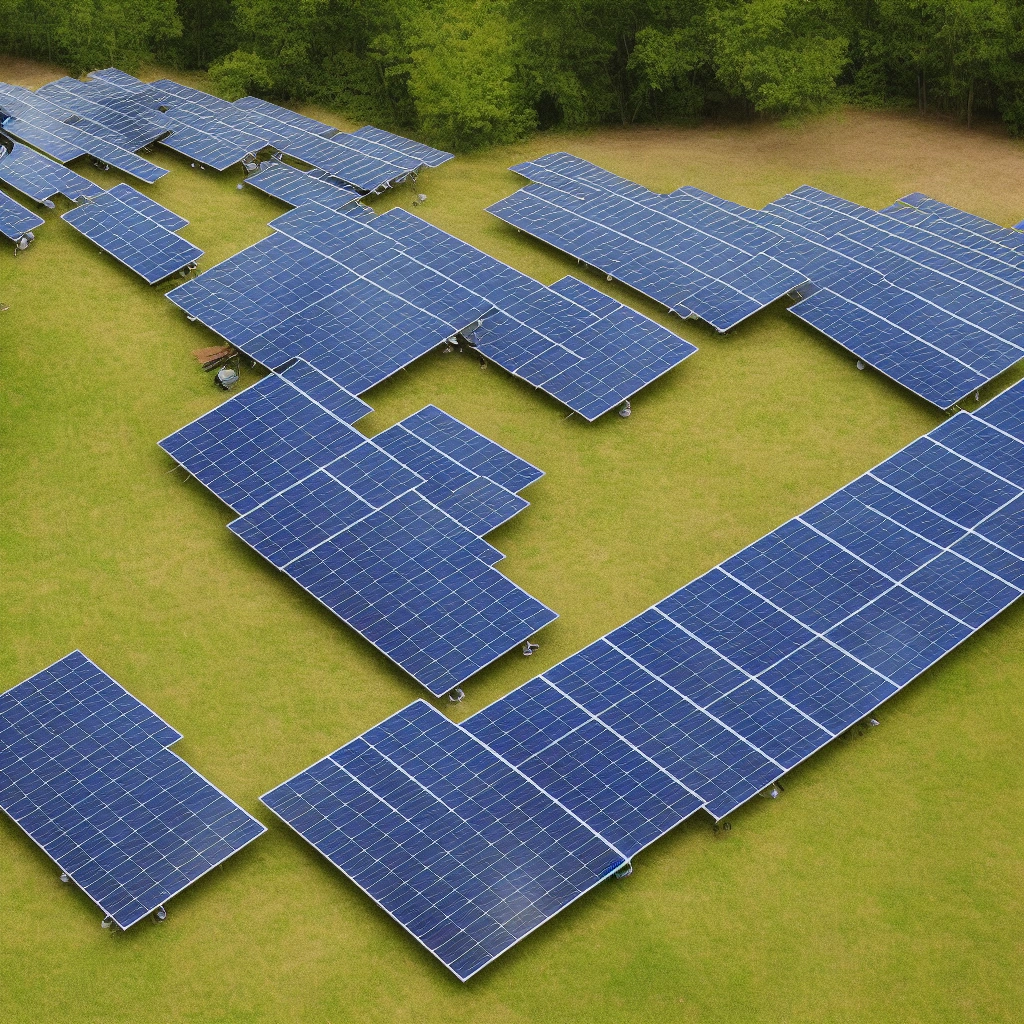Off-Grid Appliance Selection for 2025: Maximizing Efficiency with Solar Power
Introduction: Powering Your Off-Grid Dream
Stepping away from the grid in 2025 and beyond demands a strategic approach to appliance selection, where energy efficiency reigns supreme. Whether you’re building your off-grid haven from scratch or optimizing an existing solar setup, the appliances you choose will directly impact your energy independence and overall comfort. This comprehensive 2025 guide delves into the critical aspects of off-grid appliance selection, offering expert insights to empower your transition to a sustainable lifestyle. Choosing appliances optimized for solar power is not just about minimizing your energy footprint; it’s about maximizing your self-sufficiency and enjoying the freedom of off-grid living. Understanding the nuances of energy consumption, appliance technology, and long-term reliability will pave the way for a truly successful off-grid experience. Living off-grid requires a shift in mindset, moving away from energy-hungry conventional appliances and embracing innovative solutions designed for low-power consumption. Prioritizing energy-efficient appliances is paramount to reducing your reliance on solar panels and battery storage, thus minimizing your initial investment and maximizing your system’s lifespan. This translates to greater freedom from the grid and significant long-term cost savings. One of the key aspects of successful off-grid living is carefully calculating your energy needs and matching them with appropriately sized appliances. For instance, a large, energy-starved refrigerator may strain your solar power system, while a smaller, DC-powered refrigerator designed for off-grid use could operate seamlessly. Similarly, choosing a non-electric washing machine or a highly efficient DC-powered model can significantly reduce your energy consumption compared to a standard grid-tied appliance. In 2025, the market offers a wide range of off-grid appliances designed with efficiency and sustainability in mind. From solar refrigerators and freezers to DC-powered washing machines and LED lighting, the options available cater to diverse needs and budgets. This guide will explore the latest advancements in off-grid appliance technology, including innovative features like variable-speed DC compressors, smart energy monitoring systems, and advanced insulation materials. By understanding these technologies, you can make informed decisions that align with your off-grid goals and maximize your energy independence. Furthermore, this guide will address the importance of reliability and maintenance in the off-grid context. Choosing durable, well-built appliances from reputable brands like SunDanzer, Whynter, and Unique Off-Grid Appliances is a crucial investment in your off-grid future. Proper maintenance practices, such as regularly cleaning condenser coils and ensuring adequate ventilation, will further extend the lifespan of your appliances and optimize their performance in the long run. By following the expert advice and practical tips presented in this guide, you can confidently navigate the world of off-grid appliance selection and create a comfortable and sustainable off-grid home in 2025 and beyond.
Energy-Efficient Appliance Essentials
Refrigerators and freezers are major energy consumers in any household, but even more so in off-grid settings where power generation is limited. Choosing a highly efficient model is crucial for minimizing your solar power system’s load and maximizing its lifespan. Look for refrigerators and freezers with high Energy Star ratings, which indicate superior energy efficiency compared to standard models. Prioritize models with DC compressors specifically designed for off-grid solar setups, as they operate directly on DC power, eliminating energy losses associated with AC to DC conversion. Efficient insulation also plays a critical role in maintaining low energy consumption by reducing heat transfer and keeping the contents cold. For freezers, chest models generally outperform upright models in energy retention due to their design, which minimizes cold air loss when opened. In the context of 2025, advancements in insulation materials and compressor technology are leading to even more efficient refrigeration options for off-grid living. Consider exploring propane-powered refrigerators as another alternative for off-grid refrigeration, especially in locations with limited sunlight. Washing machines are another essential appliance to consider carefully for off-grid living. Minimizing both water and energy consumption is key to sustainable off-grid laundry practices. Front-loading washing machines are generally more efficient than top-loading models, using less water and energy per cycle. Look for models with specialized eco-cycles and adjustable water levels for further optimization. For off-grid scenarios, consider non-electric or manually powered washing machines as a viable option for reducing reliance on solar power. These options, while requiring more physical effort, can significantly reduce your energy footprint. In 2025, advancements in water-efficient washing technologies are making off-grid laundry more sustainable than ever before. Lighting is a fundamental aspect of any home, and in off-grid settings, energy-efficient lighting is paramount. LED lights are the undisputed champions of energy efficiency, consuming up to 80% less energy than traditional incandescent bulbs. They also have a significantly longer lifespan, reducing replacement frequency and waste. For off-grid solar systems, LED lighting minimizes the strain on your power supply, allowing you to maximize the use of your solar-generated electricity for other essential appliances. Explore the latest advancements in smart LED lighting, which offers features like dimming, motion sensors, and remote control for enhanced energy savings and convenience. These features align perfectly with the 2025 focus on smart, energy-efficient homes, whether on or off the grid. Consider incorporating solar-powered outdoor lighting to further reduce your reliance on your main power system. Solar-powered garden lights, pathway lights, and security lights are readily available and can enhance the safety and aesthetics of your off-grid property.
Reliability and Maintenance: Ensuring Long-Term Performance
In the context of off-grid living, appliance reliability takes on paramount importance. Distance from repair centers and the reliance on often limited solar power necessitate choosing appliances built to withstand demanding conditions and deliver consistent performance. Prioritize brands known for robust construction, quality components, and proven longevity in off-grid environments. Reputable manufacturers like SunDanzer, Whynter, and Unique Off-Grid Appliances specialize in appliances designed for off-grid use, offering durability and features tailored to solar power systems. Investing in durable, reliable appliances minimizes the risk of disruptions to essential services like refrigeration and water heating, ensuring a smoother, more sustainable off-grid experience. When researching appliances, look for user reviews and expert opinions that attest to long-term performance and resilience in off-grid settings. This proactive approach can save significant costs and headaches in the long run. Regular maintenance is essential for maximizing the lifespan and efficiency of your off-grid appliances. Dust and debris can accumulate on condenser coils, reducing cooling efficiency and increasing energy consumption. Regularly cleaning these coils, checking door seals for airtightness, and ensuring proper ventilation around appliances are crucial steps. For solar refrigerators and freezers, maintaining proper battery health is also vital. This includes preventing deep discharges and ensuring adequate ventilation around the batteries. By adhering to a consistent maintenance schedule, you can optimize appliance performance, extend their lifespan, and minimize energy waste, crucial factors in a successful off-grid setup. Choosing energy-efficient appliances is paramount for optimizing your off-grid solar power system. Look for appliances with high Energy Star ratings, indicating superior energy efficiency compared to standard models. DC-powered appliances, specifically designed for off-grid systems, are often more efficient than their AC counterparts and can be directly powered by your solar batteries. Consider investing in a DC refrigerator or freezer, which eliminates the need for an energy-consuming inverter. For lighting, LED lights are the undisputed champions of energy efficiency, consuming significantly less power than traditional incandescent or fluorescent bulbs. Prioritizing energy-efficient appliances reduces the strain on your solar power system, allowing you to maximize your energy independence and minimize reliance on backup generators. In 2025, the off-grid appliance market offers specialized options tailored to solar-powered systems. Solar refrigerators and freezers, designed for DC power, are becoming increasingly sophisticated and efficient. Look for models with features like variable-speed compressors and advanced insulation to minimize energy consumption. Off-grid washing machines, including non-electric and portable options, provide efficient cleaning solutions without straining your solar power system. Furthermore, explore the latest advancements in LED lighting technology, such as smart bulbs with adjustable color temperature and dimming capabilities, offering both energy efficiency and enhanced ambiance. Staying informed about these specialized off-grid appliances can help you build a comfortable and sustainable off-grid home.
Top Product Recommendations for 2025
Refrigerators and freezers are essential appliances for off-grid living, but they also tend to be the most energy-intensive. For 2025, DC-powered refrigerators like the SunDanzer models are a top choice due to their direct compatibility with solar power systems, eliminating the need for inverters and increasing overall efficiency. The Whynter FM-45G, known for its portability and rugged design, is another excellent option for smaller off-grid setups or those seeking a secondary refrigeration unit. For those prioritizing compact, highly efficient refrigeration, the Unique 12V Refrigerator offers a great solution. When selecting a refrigerator, consider factors like storage capacity, energy consumption rate (measured in kilowatt-hours per year), and climate class to ensure optimal performance in your specific environment. Consulting online reviews and comparing specifications can help you identify the perfect balance of efficiency, capacity, and durability. For freezers, chest freezers like the Whynter CUF-210SS excel at energy retention due to their design, minimizing cold air loss when opened. The SunFrost RF16, while a higher initial investment, offers exceptional energy efficiency and long-term reliability, making it a worthwhile consideration for serious off-grid enthusiasts. Vestfrost also offers reliable and efficient freezer models like the VF100, catering to various capacity needs. When evaluating freezers, consider factors like the type of insulation, the compressor efficiency, and the presence of features like a power-loss alarm, especially crucial in off-grid scenarios. Washing machines present another key consideration for off-grid living. Non-electric options like the Wonderwash Non-electric Portable Washer and the Lavario Portable Clothes Washer minimize energy consumption while still providing effective cleaning. These manual options are ideal for smaller households or those prioritizing minimal energy footprints. For larger families or those seeking more automated solutions, The Laundry Pod offers a compact and efficient electric washing machine suitable for off-grid use with a smaller solar power system. Choosing the right washing machine involves balancing water usage, energy efficiency, and load capacity. Consider your household size and laundry needs when making your selection. Each of these recommended appliances offers a unique blend of efficiency, performance, and off-grid suitability. Remember to carefully assess your specific energy needs, budget, and lifestyle requirements when making your final decision. Investing in high-quality, energy-efficient appliances is a crucial step towards achieving a comfortable and sustainable off-grid lifestyle in 2025 and beyond. By carefully considering factors such as energy consumption, reliability, and maintenance requirements, you can optimize your solar power system and enjoy the benefits of self-sufficient living.
Calculating Energy Needs and Cost Analysis
Accurately calculating your daily energy consumption is the cornerstone of a successful off-grid solar setup. Begin by determining the wattage of each appliance you plan to use. This information is typically found on a label on the appliance or in its user manual. Multiply each appliance’s wattage by its estimated daily usage hours. For instance, a 150-watt refrigerator running for 10 hours a day consumes 1500 watt-hours (Wh). Sum the watt-hour consumption of all your appliances to arrive at your total daily energy requirement. This total, expressed in Wh or kilowatt-hours (kWh), is crucial for sizing your solar power system and battery bank appropriately. Investing in a reliable energy meter can provide real-time data on your energy usage, allowing you to fine-tune your calculations and identify potential energy savings. For those embracing off-grid living in 2025, understanding energy consumption is more critical than ever, given the increasing sophistication and energy demands of modern appliances. Consider using an online energy audit tool or consulting with a solar installer to refine your energy calculations and ensure your off-grid system meets your specific needs. This step is particularly important for those planning to power larger appliances like off-grid washing machines or DC air conditioners. Next, factor in the initial purchase costs of your chosen energy-efficient appliances. While high-efficiency models might have a higher upfront cost, their reduced energy consumption translates to long-term savings, making them a worthwhile investment for off-grid living. Remember to consider the estimated running costs of each appliance based on your calculated energy usage. A 2025 guide to off-grid living must emphasize the importance of lifecycle cost analysis. This involves comparing the initial cost, running costs, and expected lifespan of different appliance models to make informed decisions that maximize your return on investment. For example, while a solar refrigerator might have a higher initial cost than a conventional model, its lower running costs and longer lifespan, especially with proper maintenance, can result in significant savings over time. Finally, evaluate the potential long-term savings achieved through energy efficiency. By opting for energy-efficient appliances and implementing smart energy management strategies, you can significantly reduce your reliance on your solar power system, minimizing battery usage and extending the lifespan of your off-grid setup. Transitioning to LED lighting throughout your off-grid home offers a prime example of energy efficiency in action. LED lights consume significantly less energy than traditional incandescent or fluorescent bulbs, resulting in substantial savings over the long term. Incorporating these energy-saving practices not only reduces your environmental impact but also enhances the financial viability of your off-grid lifestyle. Choosing DC appliances, specifically designed for off-grid solar systems, further optimizes energy efficiency and reduces energy losses associated with AC to DC conversion. This is particularly important for appliances like refrigerators and freezers, which are major energy consumers in an off-grid setting.
Emerging Technologies in Off-Grid Appliances
The off-grid landscape is constantly evolving, with advancements in battery technology, smart appliances, and energy management systems paving the way for a more efficient and sustainable future. Lithium-ion batteries, already a popular choice for off-grid systems, are becoming even more energy-dense, allowing for smaller battery banks with greater storage capacity. This translates to cost savings and increased flexibility in system design for off-grid living enthusiasts. Solid-state batteries, an emerging technology, hold even greater promise with their potential for even higher energy density, improved safety, and longer lifespans. While not yet mainstream in 2025, keeping an eye on their development is crucial for future-proofing your off-grid power setup. Smart appliances are also gaining traction in the off-grid world. Refrigerators, washing machines, and even lighting systems are now available with integrated energy monitoring and optimization features. These appliances can communicate with your solar power system and battery bank to adjust energy consumption based on available power and usage patterns, maximizing efficiency and reducing strain on your system. For example, a smart refrigerator can automatically reduce its cooling cycle during peak solar hours, conserving energy and extending the life of your battery bank. Imagine a solar-powered refrigerator that automatically adjusts its cooling cycle based on the available sunlight, or a washing machine that schedules its operation for times of peak solar production. These intelligent appliances are becoming increasingly sophisticated, offering homeowners granular control over their energy usage and contributing to a more efficient off-grid ecosystem. In the realm of lighting, advancements in LED technology continue to drive efficiency gains. LED lights are already incredibly energy-efficient compared to traditional incandescent bulbs, but newer models are pushing the boundaries even further with improved brightness and color rendering. This translates to significant energy savings, especially in off-grid settings where every watt counts. Staying informed about these emerging technologies is essential for anyone considering or already living off-grid. By embracing innovation and incorporating these advancements into your off-grid setup, you can maximize efficiency, reduce your environmental footprint, and enjoy a more comfortable and sustainable lifestyle in 2025 and beyond. Researching brands like SunDanzer, Whynter, and Unique Off-Grid Appliances that are at the forefront of integrating these technologies into their products is a great starting point. Remember, choosing energy-efficient appliances is an investment in your off-grid future, and understanding the latest trends will help you make informed decisions that benefit both your wallet and the planet.


